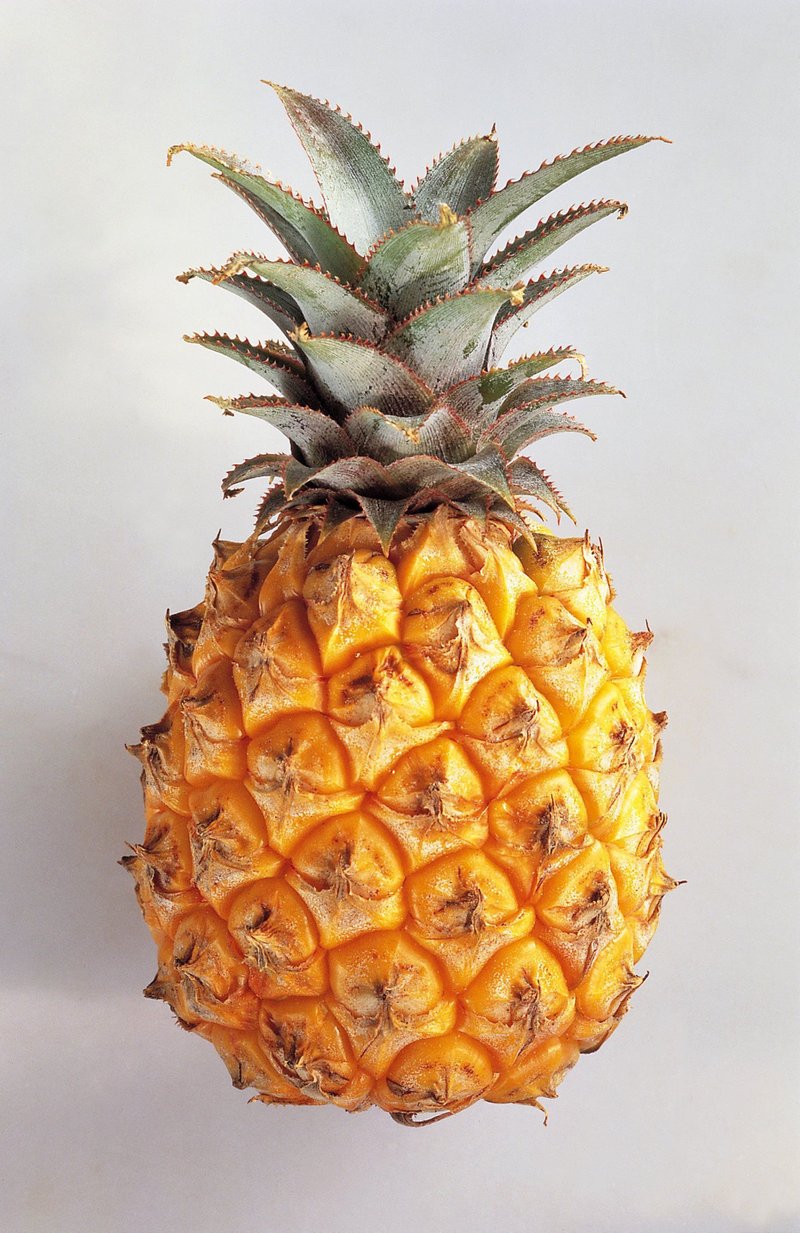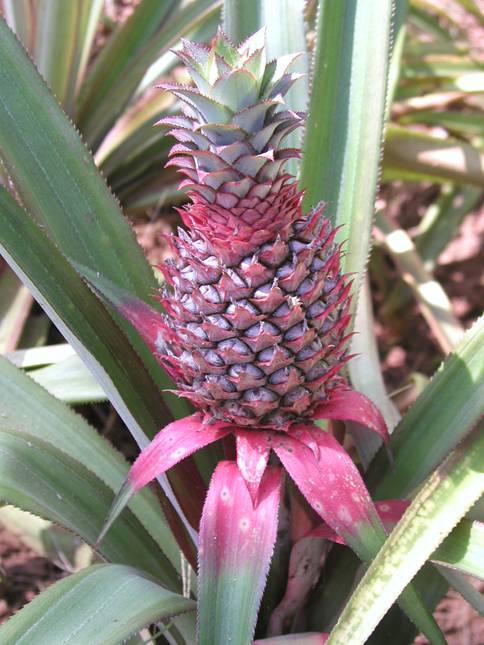
Crop: Pineapple
Scientific name : Ananas comosus
Common / Local Name : Ananas

Pineapple is one of the commercial fruit crops of Goa. It originated in Brazil and then spread to other tropical parts of the world. The cultivation of Pineapple is confined to high rainfall and humid coastal regions in the peninsular India and hilly areas of north-eastern regions of the country. In Goa, it is cultivated in an area of 336 hectares with an annual production of 5,040 tonnes. Pineapple grows well in humid tropical condition, in coastal belts as well as inlands. Optimum temperature requirement is 22 to 32oC. It can be grown up to 1100m above mean sea level, if frost free. An optimum rainfall of 100-150 cm is required, but still pineapple performs well under high rainfall zone and also under dry zones with supplementary protective irrigations during dry spell. The plants can come up well in any type of soil except heavy clay. Sandy loam is ideal for pine apple. Soil of 45-60 cm depth without hard pan or stones and with pH of 5.0-6.0 is highly preferred.
The field should be well-ploughed and made to fine tilth. The ideal time of planting would be April-May or August to October in order to avoid harvests during rainy seasons
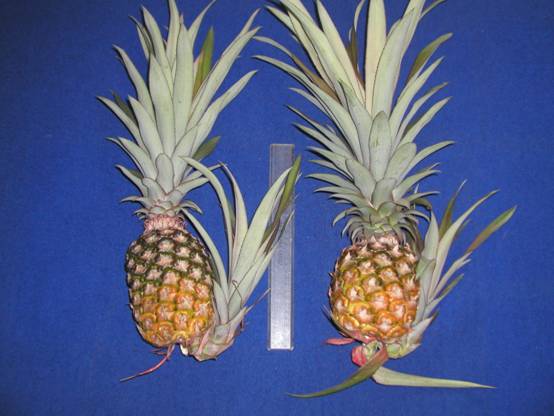
The propagation materials used are suckers and slips. Uniform sized slips weighing around 350g are used for planting. Suckers and slips are usually preferred for planting since they flower comparatively earlier than crown. The suckers are planted in trenches with a spacing of 90x60x30 cm to accommodate 43,500plants/hectare as a sole or main crop (see Fig 1). In Goa, the local variety is planted as intercrop in slopes under partial shade of cashew and other wild trees, accommodating around 20,000 plants / hectare.
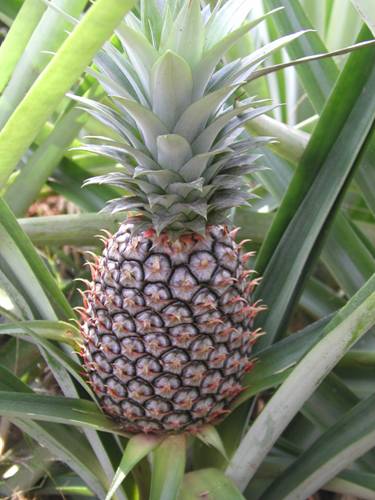 Giant Kew
Giant Kew
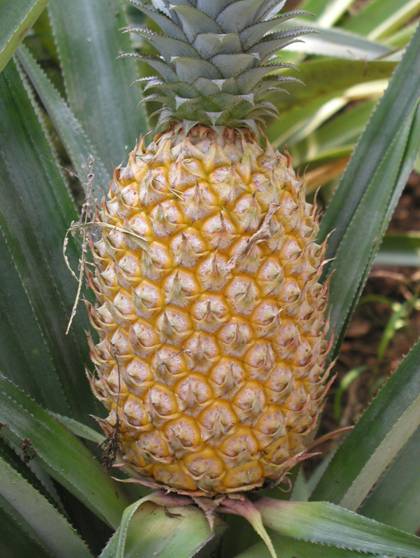 Queen or common queen
Queen or common queen
 Red Spanish
Red Spanish
Giant Kew: Leading commercial variety, late maturing type, fruit weighs from 2.0 to 2.5 kg, oblong in shape, eyes are broad, fibreless and very juicy
Queen or common queen: Fruits weighs 0.9 to 1.3kg, less juicy, less fibrous, crisp with pleasant aroma and flavour
Red Spanish: Fruit is rather square in shape, weighs between 0.9 to 1.8kg, pale yellow flesh, fibrous, juicy with spicy acid flavour. The local type cultivated in Goa falls under this category.(Fig 5)
Pineapple is shallow feeder with high N and K requirement. A dose of N, P2O5 and K2O at 12, 4 and 12g/plant/year respectively is optimum. Application of fertilizer under rain fed conditions should be done when moisture is available i.e. during monsoon season.
Table 1
Months after planting |
N |
Urea |
P2O5 |
Rock Phosphate |
K2O |
MOP |
g/plant/year |
g/plant/year |
g/plant/year |
||||
0 |
- |
- |
4 |
13.5 |
- |
- |
2 |
2 |
4.4 |
- |
- |
- |
- |
4 |
2 |
4.4 |
- |
- |
- |
- |
6 |
2 |
4.4 |
- |
- |
6 |
36.0 |
8 |
2 |
4.4 |
- |
- |
- |
- |
10 |
2 |
4.4 |
- |
- |
- |
- |
12 |
2 |
4.4 |
- |
- |
6 |
36.0 |
Total |
12 |
26.40 |
4 |
13.5 |
12 |
72.0 |
Irrigate once in 5-6 days
Weeding as and when required to keep field clean.
Earthing up is an essential operation which will result in good anchorage. It is more important in ratoon crop. Mulching is essential to conserve soil moisture as well to check weed growth. Spraying Glyphosate @ 4-5 ml/L or Diuron 2 4 ml/ l is recommended to control the weeds. Fruit weight increases with increasing number of suckers per plant, while more number of slips delays fruit maturity. Hence desuckering can be delayed as much as possible, while slips are recommended for removal as soon as they attain the size required for planting.
Normally, pine apple flowers 10-12 months after planting and fruits are ready for harvest after 5-6 months of flowering. Besides time of planting, flower induction practices with certain chemicals or growth regulators influence the season of harvest. Ethrel @ 0.025 ml/l + 2 % urea + 0.04 % Sodium carbonate induce more than 90 % flowering, as urea helps in better absorption and sodium carbonate increases release of ethylene. Therefore for 1000 plants, 50 litres of solution has to be prepared by dissolving 1.25 ml of ethrel + 1 kg of urea + 20 g of sodium carbonate. Around 50 ml of this solution has to be poured in the crown. Similarly, 95 percent of flowering within 56 days could be induced by applying 50ml of solution containing calcium carbide (1%) and urea (2%) at the age of 12 months. In ratoon crop of Giant Kew, calcium carbide (1%) and urea (2%) applied in the whorl of plants in September-October induced flowering within one month and the fruits were ready for harvesting in first week of March to end of May. The planting and flower induction schedule can be planned as follows so as to accomplish staggered harvest and unbroken market availability through out the season ie from October to May.
Table 2
Month of Planting |
Month of application of growth regulators in the next year |
Months taken for flower induction |
Harvesting month |
April |
March-April |
1-2 |
October-November |
May |
April-May |
1-2 |
November-December |
August |
July-August |
1-2 |
February-March |
September |
August-September |
1-2 |
March-April |
October |
September-October |
1-2 |
April-May |
November |
October-November |
1-2 |
May-June |
When plants of optimum size (35-40 fully grown and active leaves) are induced to flower, better fruit size is obtained without any adverse effects on the ratoon crop
Pineapple plants flower 10-12 months after planting and fruits become ready 15-18 months after planting.
Table 3
Variety/Yield |
Main crop (t/ha) |
Ratoon crop (t/ha) |
Giant Kew |
90-100 |
60-65 |
Queen |
75-80 |
50-60 |
Local |
50-60 |
40-45 |
Dessert, Squash, Juice, Jam etc
Input availability |
Address/Contact details |
| Plants | ICAR farm/ State Govt Farms |
Fertilizers |
For detailed list kindly click here |
Pesticides |
For detailed list kindly click here |
| Machineries | Goa Bagayatdar Stores |
|
